|
|
|
Sort Order |
|
|
|
Items / Page
|
|
|
|
|
|
|
| Srl | Item |
| 1 |
ID:
148916
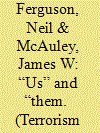

|
|
|
|
|
| Summary/Abstract |
This article draws on data from one-to-one interviews with members and former members of the Ulster Volunteer Force, Ulster Defence Association, Red Hand Commando, Ulster Political Research Group, and the Progressive Unionist Party to explore the dynamic and fluid perceptions of the Irish Republican Army (IRA) and Sinn Féin among Ulster loyalists. The article will explore how attitudes and perceptions are influenced by the shifting political landscape in Northern Ireland as Ulster loyalists come to terms with the new realities created by the peace process, security normalization, decommissioning, and the rise in the threat of dissident republican violence. The article will also demonstrate that these perceptions are not purely antagonistic and based on the creation of negative, stereotypical “enemy images” fuelled by decades of conflict, but pragmatic, bound to societal and local events, and influenced by intragroup attitudes and divisions, in addition to the expected conflictual ingroup vs. outgroup relationships. Finally, the article will explore how loyalists employ republicanism and the transformation of the Provisional IRA in particular, as a mirror or benchmark to reflect on their own progress since 1994.
|
|
|
|
|
|
|
|
|
|
|
|
|
|
|
|
| 2 |
ID:
131883
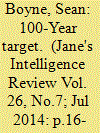

|
|
|
| 3 |
ID:
167839
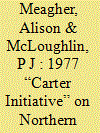

|
|
|
|
|
| Summary/Abstract |
Scholars have extensively documented the vital role of the Clinton administration in the early stages of the Northern Ireland peace process.1 However, Clinton’s intervention in Northern Ireland was not the first by a U.S. president. That came two decades earlier, with the Carter administration. Carter’s brief foray into Northern Ireland politics was obviously more limited than Clinton’s lengthy engagement, and is also less celebrated. This is understandable given the direct role that Clinton, and more particularly his envoy to Northern Ireland, Senator George Mitchell, played in brokering the 1998 Good Friday Agreement (GFA), which underpins the peaceful settlement that the region still enjoys today. But in some ways Carter’s role can be seen as more significant than, or certainly foundational to, Clinton’s efforts. Carter’s intervention came during the Cold War, which had an indirect effect on Northern Ireland.2 Despite significant agitation from Irish America, successive U.S. administrations refused to comment on Northern Ireland, deeming it a purely internal affair—and often a matter of considerable international embarrassment—of the British government, Washington’s key ally in a Cold War context.
|
|
|
|
|
|
|
|
|
|
|
|
|
|
|
|
| 4 |
ID:
172395
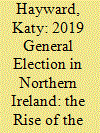

|
|
|
|
|
| Summary/Abstract |
The experience of the 2019 general election in Northern Ireland took a very different course to that of the rest of the UK and, indeed, to the pattern of electoral politics typical of the region. Coming after almost three years with no functioning devolved government, combined with intense disagreement and uncertainty about Brexit, voters were ready to give a message to the two largest parties. Both Sinn Féin and the DUP suffered losses in the election, with the headline outcome being that unionism no longer holds the majority of seats for Northern Ireland in Westminster. More generally, there was a swing from both sides towards centre ground voting, which brought significant gains for the Alliance Party and the SDLP. This article summarises the reasons for this broad trend, focussing on the conditions and electoral pacts which brought it about. It also considers what it might mean for the prospects for Irish unification, noting that a referendum on unification will only be passed by attracting votes from those who tend to see themselves as neither unionist or nationalist.
|
|
|
|
|
|
|
|
|
|
|
|
|
|
|
|
| 5 |
ID:
187033
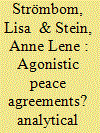

|
|
|
|
|
| Summary/Abstract |
Later years have seen the growth of a vibrant theoretical discussion on agonistic peace and the importance of creating space for contestation, plurality, and dissensus post-accord. However, there has been very few attempts at embedding agonistic theory in empirical analyses of peace agreements. This study attends to that lacuna by investigating how agonistic principles can be integrated and investigated in peace agreements. We suggest a threefold set of indicators for assessing the degree to which peace agreements are invested with agonistic dynamics: (1) what types of spaces for interaction are offered post-accord; (2) what forms of inclusion are stipulated; and (3) how is the peace agreement framed in terms of conflict termination and consensus/dissensus? We illustrate how the various indicators could be put into motion in concrete analyses applying them to examples from the Oslo Accords, the Belfast Agreement, and the Colombian Peace Agreement. Finally, we discuss four dilemmas and problematiques of integrating agonistic ideas in peace agreements; the issue of power, the mixing of agonistic and liberal ideals in peace agreements, the principle of ‘nothing is agreed until everything is agreed’ and the related double-edged potential of constructive ambiguity and finally the challenges of implementing peace agreements.
|
|
|
|
|
|
|
|
|
|
|
|
|
|
|
|
| 6 |
ID:
077007
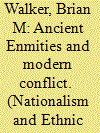

|
|
|
|
|
| Publication |
2007.
|
| Summary/Abstract |
This article investigates the role of history and historical consciousness in deeply divided societies. It looks at the case of Northern Ireland. It argues that, while the conflict here is caused by contemporary divisions, perceptions of the past have had considerable influence. Recent years have seen efforts to change historical attitudes and this has aided political accommodation. An important lesson from the conflict in Northern Ireland points to the need to challenge such historical perceptions.
|
|
|
|
|
|
|
|
|
|
|
|
|
|
|
|
| 7 |
ID:
186196
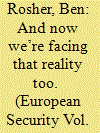

|
|
|
|
|
| Summary/Abstract |
Though conspicuous by its absence in debates among the British political and media establishments during the EU referendum campaign, the Irish border has been the central feature of Brexit as the implications and complications of trying to “take back control of borders” have become apparent. Drawing on focus group data gathered between 2017 and 2019 I employ ontological security theory to investigate the impact that Brexit is having on residents and communities living in the central Irish border region. In particular, I draw on the work of David Carr to explore the social role of memory and narrative in ontological (in)security and how this has manifested in the border region throughout the Brexit process. I find that the uncertainties generated by Brexit have caused border residents to draw on anxiety-filled memories and narratives from the securitised border of the pre-Good Friday Agreement era which they then project onto and vicariously through the next generation who, in turn, embody these anxieties, creating intergenerational ontological insecurity. Brexit has reintroduced, if not the physical border, the psychological borders of the past.
|
|
|
|
|
|
|
|
|
|
|
|
|
|
|
|
| 8 |
ID:
107205
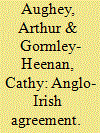

|
|
|
|
|
| Publication |
2011.
|
| Summary/Abstract |
This article examines the surprisingly muted commemoration of the 25th anniversary of the Anglo-Irish Agreement. It was surprising because not only was the Agreement a major innovation in relations between the two states but it was also the defining political issue in Northern Ireland for almost a decade. It is argued that the significance of the Agreement has been diminished because of retrospective narratives which serve the political convenience of the key parties to the Northern Ireland conflict. The article adapts Oakeshott's notion of the 'dry wall' to re-assess and to re-state the Agreement's place in recent history.
|
|
|
|
|
|
|
|
|
|
|
|
|
|
|
|
| 9 |
ID:
077293
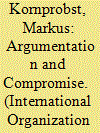

|
|
|
|
|
| Publication |
2007.
|
| Summary/Abstract |
How do states come to select norms? I contend that, given a number of conditions are present, states select norms in three ideal-typical stages: innovative argumentation, persuasive argumentation, and compromise. This norm selection mechanism departs from the existing literature in two important ways. First, my research elaborates on the literature on advocacy networks. I explain why agents engage in an advocacy for a normative idea in the first place; I add the epistemic dimension of reasoning to argumentation theory; and I show in detail the pathways through which persuasive argumentation links an advocated idea and already-established sets of meaning. Second, synthesizing rationalist and constructivist selection mechanisms, I contend that successful argumentation makes recalcitrant actors eager to reach a compromise with the advocates as long as this does not violate their most cherished beliefs. The Republic of Ireland's eventual selection of the territorial status quo norm in the late 1990s lends empirical evidence to this norm selection mechanism
|
|
|
|
|
|
|
|
|
|
|
|
|
|
|
|
| 10 |
ID:
080578
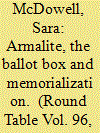

|
|
|
|
|
| Publication |
2007.
|
| Summary/Abstract |
Commemoration of the Northern Ireland Troubles has gained increasing currency since the inception of the first paramilitary ceasefires in 1994. Imagined initially as a mechanism through which to express grief and acknowledge loss, remembering the past has an increasingly social and political value. Inscribing narratives of the past into the streetscape is inexorably linked to the present as some of the main actors of the conflict vie for power and territory. A political resource, memorializtion has been employed as a tool to alter the parameters of the Troubles. This paper focuses on the changing fortunes of Sinn Féin (the political wing of the paramilitary organiztion the Irish Republican Army), and the British government in peacetime Northern Ireland, through an examination of the commemoration of their respective dead
|
|
|
|
|
|
|
|
|
|
|
|
|
|
|
|
| 11 |
ID:
181047
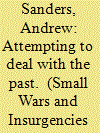

|
|
|
|
|
| Summary/Abstract |
Over the summer of 2019 a number of maroon banners appeared across towns and cities in Northern Ireland, declaring that the local population ‘stands with Soldier F’. Soldier F was a member of the Parachute Regiment who, in March of 2019, was charged with the murders of James Wray and William McKinney and five additional attempted murders as a result of his actions on Bloody Sunday, 30 January 1972. These charges were announced at a time when it was reported that up to 200 former members of the British Army could face official investigation for their conduct in Northern Ireland. These cases sit at the centre of the sensitive and divisive issue of the legacy dimension of the Northern Ireland conflict, posing a challenge to the continuing success of the Northern Ireland peace process. Engaging a developing literature on post conflict reconciliation processes, this article will analyse the issue of legacy prosecutions from Operation Banner.
|
|
|
|
|
|
|
|
|
|
|
|
|
|
|
|
| 12 |
ID:
172407
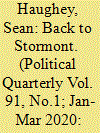

|
|
|
|
|
| Summary/Abstract |
The decision of the Democratic Unionist Party and Sinn Féin to once again share power in Northern Ireland has ended a three‐year hiatus in the region’s devolved government. The deal which resurrects the devolved institutions—New Decade, New Approach—is not short of ambition. It introduces significant institutional reforms which place the institutions on a more sustainable footing and limit the potential for abuse of the Assembly’s infamous Petition of Concern. Nettles have been grasped on issues to do with language, culture, and identity that have long vexed political parties in Northern Ireland. Tucked away in the deal’s appendices are commitments to implement outstanding pledges made in previous agreements, plus ambitious plans for the new Northern Ireland Executive. However, as parties in the region were quick to discover, aspects of this deal are easier said than done. This article considers what New Decade, New Approach promises and, if fully implemented, what its implications are for politics and governance in Northern Ireland.
|
|
|
|
|
|
|
|
|
|
|
|
|
|
|
|
| 13 |
ID:
159999
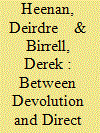

|
|
|
|
|
| Summary/Abstract |
It is over a year since the collapse of the devolved administration at Stormont, which left one region of the United Kingdom without a functioning executive. Reluctance to introduce direct rule from Westminster reduced Northern Ireland to a desiccated form of governance. This article examines the nature and form of government in this political vacuum. The consequences of this system are examined in terms of the absence of legislation, mechanisms for scrutiny, and participation in intergovernmental relations. In the absence of devolution and direct rule, the potential for greater involvement of the Irish government in the affairs of Northern Ireland is also considered.
|
|
|
|
|
|
|
|
|
|
|
|
|
|
|
|
| 14 |
ID:
079974
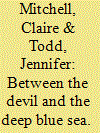

|
|
|
|
|
| Publication |
2007.
|
| Summary/Abstract |
National identity is a symbolically complex configuration, with shifts of emphasis and reprioritisations of content negotiated in contexts of power. This paper shows how they occur in one post-conflict situation - Northern Ireland - among some of the most extreme of national actors - evangelical Protestants. In-depth interviews reveal quite radical shifts in the content of their British identity and in their understanding of and relation to the Irish state, with implications for their future politics. The implications for understanding ethno-religious nationalism, nationality shifts and the future of Northern Ireland are drawn out
|
|
|
|
|
|
|
|
|
|
|
|
|
|
|
|
| 15 |
ID:
148781
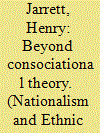

|
|
|
|
|
| Summary/Abstract |
This article analyzes the potential for consociational power sharing to pave the way for the formation of a shared identity in divided societies. It compares consociational arrangements in Northern Ireland and Brussels and argues that if this is achievable it will be demonstrated in the more liberal case of the former, rather than the corporate case of the latter. In concluding that greater intergroup engagement is occurring in Brussels than in Northern Ireland, this article challenges the ability of consociationalism to mitigate identities and looks to other factors to explain this finding.
|
|
|
|
|
|
|
|
|
|
|
|
|
|
|
|
| 16 |
ID:
023603
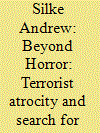

|
|
|
|
|
| Publication |
Jan-Feb 2003.
|
| Description |
37-60
|
|
|
|
|
|
|
|
|
|
|
|
|
|
|
|
| 17 |
ID:
066011
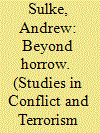

|
|
|
| 18 |
ID:
133826
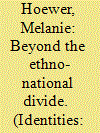

|
|
|
|
|
| Publication |
2014.
|
| Summary/Abstract |
This article examines intersecting processes of boundary formation and change during periods of conflict in Chiapas and Northern Ireland in a comparative fashion. It provides new approaches to the studies of boundaries, of intersectionality and of identity change. Looking at female activists' collective identity narratives reveals the interrelation of different processes of identity change and solidarity formation during ethno-national conflict. Those processes are determined by differences in female activists' perceptions of and positioning towards different levels of society and by spaces for bridging those boundaries. In order to enhance our understanding of ethno-national conflicts, we need to examine intersecting identity categories in relation to social change and highlight underlying and interacting processes at different levels of society that obscure and deny the existence of the gender category.
|
|
|
|
|
|
|
|
|
|
|
|
|
|
|
|
| 19 |
ID:
105189
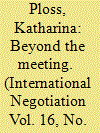

|
|
|
|
|
| Publication |
2011.
|
| Summary/Abstract |
Intercommunity dialogue encounters are a crucial tool for constructive conflict resolution. This research examines grassroots dialogue encounters with regard to the societal position of the participants, as well the situation `on the ground' as influential to the transfer process. Interviews in Northern Ireland and Kosovo with community activists stressed the effectiveness of personal characteristics of dialogue participants when it came to transfer. Moreover, the readiness - affected by socio-economic conditions as well as external/secondary conflict parties - of the peer group to listen to its participant seemed fundamental.
|
|
|
|
|
|
|
|
|
|
|
|
|
|
|
|
| 20 |
ID:
017544
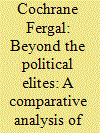

|
|
|
|
|
| Publication |
Summer 2000.
|
| Description |
1-22
|
|
|
|
|
|
|
|
|
|
|
|
|
|
|
|
|
|
|
|
|